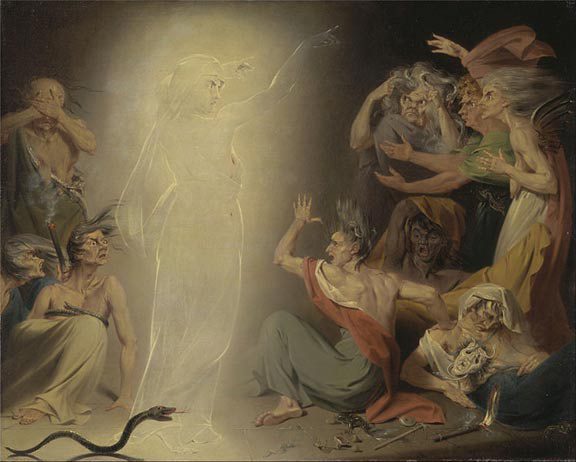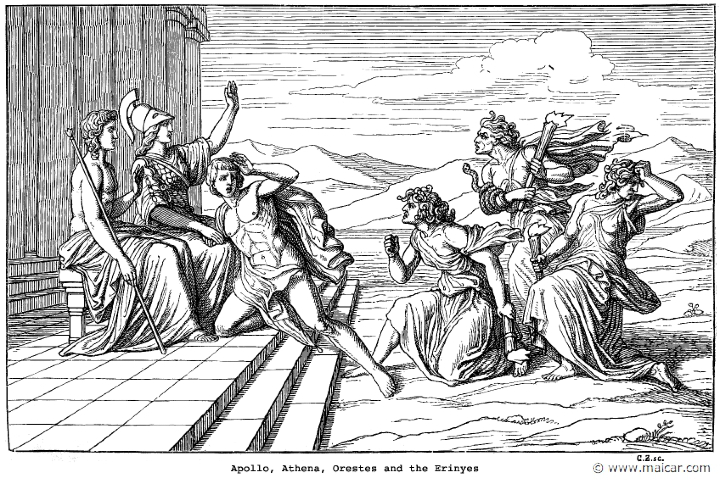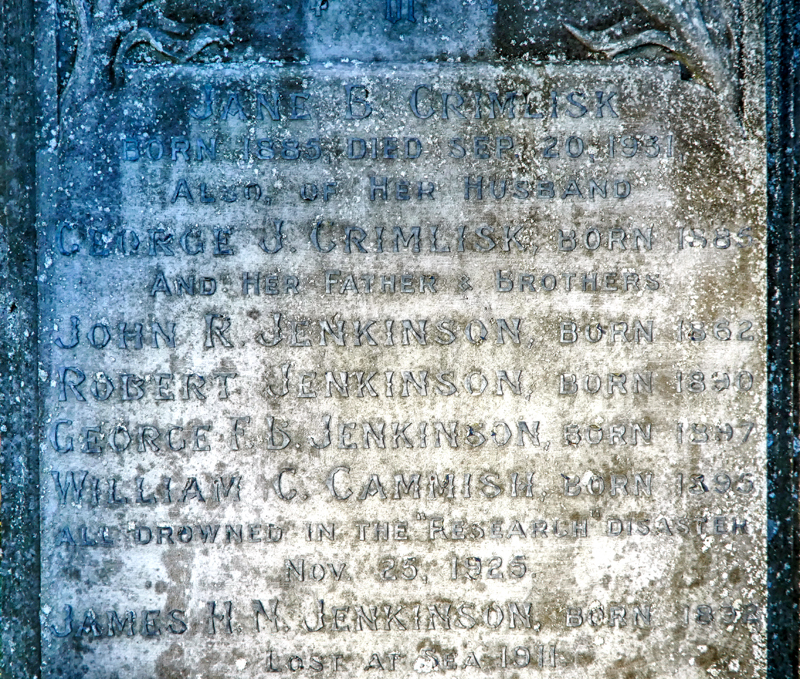Previously on The House of Atreus, Orestes, scion of the royal family of Argos, had an eventful homecoming that began in bloodshed, and ended with the Furies arising from Hell to torment him to death for killing his Ma.
Now, he’s on the run. In his madness, he’s gone back to where it all started, Delphi, hoping he can somehow convince Apollo to appear and help him out. The scene opens on both the hunters and the prey, having exhausted each other with the chase, asleep around the seat of the Oracle.
(To get the whole story, start here, at Part One)

“I knew I shouldn’t have turned the snooze capability off this new alarm clock… ” – Orestes
THE TRIAL
Pythia, priestess and head Oracle of all Delphic festivities, walked in to her office to find poor battered Orestes surrounded by snoring, and smelly, Furies. As she was already nursing a killer hangover, she promptly lost her lunch. It was the rotting stench that really got to her. After composing herself, she recognized Orestes, and remembering what a nice time she had when last he popped by, took pity on him and called upon Apollo.
“Apollo, I know that supposedly we have bouncers for this kind of thing, but think you could do me a wee favor and get rid of these nasty Furies in my office? They are, like, totally harshing my vibe.”
“Oh gods, the smell! I always forget how nasty these biddies are. I mean, whoa! Where do they even come from?”
“I think they burst into life after the severed testicles of Uranous fell to Earth.”
“Oh, right. Jeez, no wonder they never get invited to parties. Chthonic deities are the worst.”
Steering clear of the icky Furies, whom not even the gods wished to prod with a ten foot pole, Apollo granted Orestes a dream:
Keep on running from these old crones,
Though their curses rattle away at your bones,
I haven’t quite forsaken you yet,
Just forgot awhile, so no need to fret!
In Athens for you does safety now lie,
To Athena you go. Right now! Fly!
Orestes, surprised to learn that Apollo was relying on a female to fix things, ran out the door, heading for Athens and safety. The Furies, however, who were older than old, slept on. Just then, the Ghost of Clytemnestra, who was quite literally the evil mother from Hell at this point, showed up.

“If you want something done right, do it yourself” – Clytemnestra
“We are plutonic instruments of vengeance, they said. Leave it to us, they said. We’ll suck the marrow from his bones, they said. Well is this what they meant?? Sleeping on the job?!”
“Oh, Clytemnestra, it’s good to see you! How are the eternal fires of damnation?”
“They’d be a lot better if my no-good son were being devoured by a certain someone!”
“Not to worry, dear, we were just getting around to that. He’s around here somewhere… Eugenia! Where did you put that delectable Orestes?”
“He’s gone you incompetent devils! He’s been chatting with Apollo. He’s off to Athens. Apparently, Athena is going to fix all of this.”
“Apollo was here? Ugh. We hate that guy. He’s so full of himself.”
“Don’t just stand there gossiping, go get Orestes!”
With some help from Apollo, Orestes beat the furies to Athens. There, seeking out Athena, he ran to a stone simulacrum of the virgin goddess, and clasped it about the knees. The Furies were hot on his heels, though, and soon spotted him. Athena, who saw the whole grisly scene unfold, took pity on the young man and came down to see just what the ruckus was about. She wasn’t a big fan of the Furies either.

“Simmer down Apollo, I’m wearing the helmet here.” -Athena
“Hold you Stygian creatures of retribution! What’s going on here?”
“Athena! Fancy meeting you here. In your sacred city. At your devoted temple. What brings you down from Olympus?”
“The pitiful cries of this supplicant! Explain yourselves.”
“Oh, this is just Orestes. Is he bothering you? Why don’t you just let us drag him down into the depths of Hades and get him out of your hair? He’s gone and murdered his mother, you see. We’d like to do our sacred duty. Nothing too crazy, just drive him mad, bleed him dry, and devour his nerves. You know. The usual thing.”
Just then, Apollo (who couldn’t resist making an entrance) popped up to defend the blithering Orestes.
“Stop! This man is innocent. In murdering Clytemnestra he was merely doing my divine bidding!”
Athena raised a perfectly sculpted brow.
“Apollo, please do not tell me you had this poor kid kill his own mother for a lark. I do not want a repeat of the whole Cassandra fiasco.”
“This is nothing like that! Clytemnestra murdered Agamemnon, his father? It was his moral obligation to kill her!”
“But what about the blood bond between mother and son?”
“Oh come on! I think we all know that it’s the marriage pact that’s most powerfully binding.”
The Furies burst out into uncharacteristic giggling, which soon developed into gales of full throated laughter. Since when did any male Olympian god, or red-blooded mortal man for that matter, respect a marriage bond?
Athena, logical being and goddess of wisdom, weighed all possible considerations before determining Orestes’s fate.
“Look, I’ve always wanted to star in my own episode of Law and Order, so let’s scare up some jurors and have ourselves a trial! Court is officially in session!”
This was exciting stuff. No one had ever had a trail before, the preferred method being to kill whomever one deemed most responsible for the crime in question. Athena was basically inventing the modern court system. Twelve jurors were found, Athena got to play judge, Apollo stood in for the defense, and the Furies made up the prosecution.
The defense began with the startling argument that Orestes hadn’t really committed a crime at all, since he and his mother weren’t related.
“Gentleman of the jury, consider. We’re all familiar with how babies are made. A man’s seed brings the life force inside a woman, who is nothing but the shell in which the babe can mature. They are simply ovens for the proverbial bun, mere incubators for the seed of man. Therefore, only fathers can be true parents. Though she was his mother, Orestes was not related to Clytemnestra by blood, and he had every right to slay her.”
“Objection! Apollo, you can’t seriously believe this drivel?”
Said all women ever who read The Eumenides by Aeschylus. Unfortunately, women did not get a say in this particular trial. Unless you count Athena, who due to her own complicated relationship with birth and motherhood, was biased.
See, Athena wasn’t actually born, per se. Her mother was Metis, a powerful sea goddess and one of Zeus’s many conquests. There was this prophesy saying that she would bear him a son even more powerful than Zeus himself, who would eventually overthrow him, the way he did his own father Chronos, and Chronos did his father Uranous, and so on. It was the way of things.
Zeus got around this sticky issue by turning the pregnant Metis into a glass of water and guzzling her down. Nine months later (give or take), Athena sprang from his head fully formed. She had a skewed view of her gender ever since, and was indeed part of the problem.
Anyway, in the interest of having a dramatic climax, the jury was split down the middle. Six votes called Orestes guilty, and six votes proclaimed his innocence. Athena had to break the tie. Unsurprisingly, she made a speech about how unimportant mothers are, (after all she never had one and she turned out okay) and acquitted Orestes.
Because there was nothing that folks in Greek mythology feared more than a woman’s power to reproduce, everyone seemed to be alright with this outcome. Everyone, that is, but the Furies, who were truly astounded people could believe a whopper like that about the power of sperm.
Athena gave them a stern talking to, promising them a lauded place in the religion of Athenians should they drop their case. The Furies knew better than to go against the new rule of powerful Olympian deities, and capitulated. From then on, instead of tearing criminals to pieces and devouring their souls, they would do nice things, like help crops grow and make sure babies were born without deformities.
They got planted in the sacred soil of Athens, which would subsequently become the greatest city in the world for all time, naturally. Or at least it would according to Athena, who had a definite interest in the future of her namesake city.
His innocence secure, and the horrible curse lifted, Orestes returned home to rule Argos. Which, of course, descended into obscurity now that Athens was its number one ally, and destined to become El Numero Uno among Grecian city-states.
Eventually, Orestes got a snake bite in some far off land, and was buried in Sparta.
THE END
Advertisements Share this:




